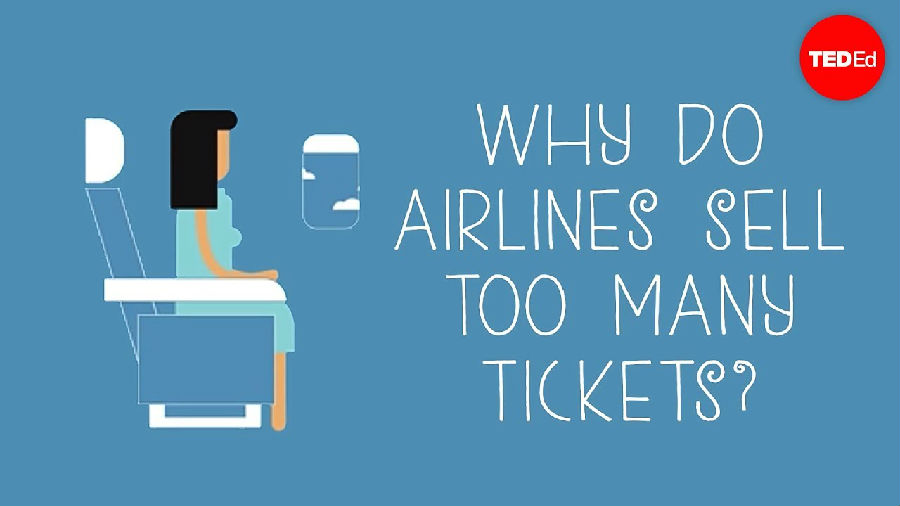(单词翻译:单击)
Have you ever sat in a doctor's office for hours despite having an appointment at a specific time?
你有没有曾经等医生几个小时看诊的经历,尽管你有提前预约特定的时间?
Has a hotel turned down your reservation because it's full?
你有没有经历过因为客满被酒店拒之门外?
Or have you been bumped off a flight that you paid for?
或者你有没有经历过被航空公司拒载,尽管你买了票?
These are all symptoms of overbooking, a practice where businesses and institutions sell or book more than their full capacity.
这些都是超额预定的现象,一个公司或者机构卖出或者预定大于他们容量的行为。
While often infuriating for the customer,
尽管这行为使客户很愤怒,
overbooking happens because it increases profits while also letting businesses optimize their resources.
超额预定的存在因为它可以增大利益,并使得公司更好的优化资源。
They know that not everyone will show up to their appointments, reservations, and flights,
明知不是所有的人都会准时赴约,看医生、投宿旅店或搭机。
so they make more available than they actually have to offer.
所以尽管额满,仍释出额外预定名额。
Airlines are the classical example, partially because it happens so often.
航空公司是最典型的例子,因为这种情况频繁发生。
About 50,000 people get bumped off their flights each year.
每年约五万名乘客因超售机票而无法登机。
That figure comes at little surprise to the airlines themselves,
航空公司对此数字一点也不意外,
which use statistics to determine exactly how many tickets to sell.
因为他们用统计数字来决定要卖多少机票。
It's a delicate operation. Sell too few, and they're wasting seats.
这是个精准的操作。卖少了,浪费座位。
Sell too many, and they pay penalties -- money, free flights, hotel stays, and annoyed customers.
卖多了,可能要付出代价--补偿金,免费机票、住宿和恼怒的客户。
So here's a simplified version of how their calculations work.
这是个简化了的计算方法。
Airlines have collected years worth of information about who does and doesn't show up for certain flights.
航空公司累计了多年的资料,知道谁会、谁不会准时出现在哪些航班的登机门。
They know, for example, that on a particular route, the probability that each individual customer will show up on time is 90%.
例如,他们会知道某个特定航线旅客有90%的机率会准时出现。
For the sake of simplicity, we'll assume that every customer is traveling individually rather than as families or groups.
为了简化运算,我们假设每个乘客都独自旅行,没携家带眷,也没参团。
Then, if there are 180 seats on the plane and they sell 180 tickets, the most likely result is that 162 passengers will board.
如果航班有180个座位,卖出180张机票,结果最可能是162个乘客登机。
But, of course, you could also end up with more passengers, or fewer.
当然,登机人数可能多于或少于此数。
The probability for each value is given by what's called a binomial distribution, which peaks at the most likely outcome.
每个数值出现的机率呈二项分布,机率最高处是最可能出现的人数。
Now let's look at the revenue.
现在看一下收益。

The airline makes money from each ticket buyer and loses money for each person who gets bumped.
航空公司收取每个乘客的机票钱,但为每个被挤下飞机的乘客付钱。
Let's say a ticket costs $250 and isn't exchangeable for a later flight.
假设每张机票二百五十元,不能改为较晚的航班。
And the cost of bumping a passenger is $800.
为每个被挤下飞机的乘客花八百元。
These numbers are just for the sake of example. Actual amounts vary considerably.
这些只是举例的数字。真正的数字各异。
So here, if you don't sell any extra tickets, you make $45,000.
所以若不超卖,赚四万五千元。
If you sell 15 extras and at least 15 people are no shows, you make $48,750. That's the best case.
超卖十五张,且至少十五人未出现,赚得48750元。这是最好的情况。
In the worst case, everyone shows up.
最坏的情况,每个人都出现。
15 unlucky passengers get bumped, and the revenue will only be $36,750,
十五名乘客不幸被挤下飞机,收益只有36750元,
even less than if you only sold 180 tickets in the first place.
比当初只卖出180张票的收益更少。
But what matters isn't just how good or bad a scenario is financially, but how likely it is to happen.
但重要的不只是每个情况的收益多好或多差,而是多容易发生。
So how likely is each scenario? We can find out by using the binomial distribution.
每个情况发生的机率是多少?可以用二项分布得到答案。
In this example, the probability of exactly 195 passengers boarding is almost 0%.
就此例而言,恰好195个乘客出现的机率接近零。
The probability of exactly 184 passengers boarding is 1.11%, and so on.
恰好184个乘客出现的机率为1.11%,以此类推。
Multiply these probabilities by the revenue for each case, add them all up,
这些机率乘以各个情况的收益,汇总起来,
and subtract the sum from the earnings by 195 sold tickets, and you get the expected revenue for selling 195 tickets.
用卖出195张票的进帐减去那个总额,就得到卖了195张票的期望收益值。
By repeating this calculation for various numbers of extra tickets,
依相同的方法计算每种超卖机票的期望收益值,
the airline can find the one likely to yield the highest revenue.
航空公司就能找出可能得到最大收益值的方案。
In this example, that's 198 tickets, from which the airline will probably make $48,774,
本例是卖198张票,航空公司可能获益48774元,
almost 4,000 more than without overbooking. And that's just for one flight.
比完全不超卖多了将近四千元。那仅是一航班而已。
Multiply that by a million flights per airline per year, and overbooking adds up fast.
乘以每一航空公司每年的百万次航班,超卖肯定急速地聚少成多。
Of course, the actual calculation is much more complicated.
当然,实际的运算要复杂得多。
Airlines apply many factors to create even more accurate models.
航空公司会加入其他因素以得出更精确的模型。
But should they? Some argue that overbooking is unethical.
但是他们应该这样做吗?有些人主张超卖是不道德的。
You're charging two people for the same resource.
你是以同一资源向两个人收费。
Of course, if you're 100% sure someone won't show up, it's fine to sell their seat.
当然,如果你百分之百确定有人将会缺席,卖掉他们的座位无妨。
But what if you're only 95% sure? 75%?
但是倘若你只有95%的把握呢?75%呢?
Is there a number that separates being unethical from being practical?
是否有一个区分不道德与实际的数值呢?


